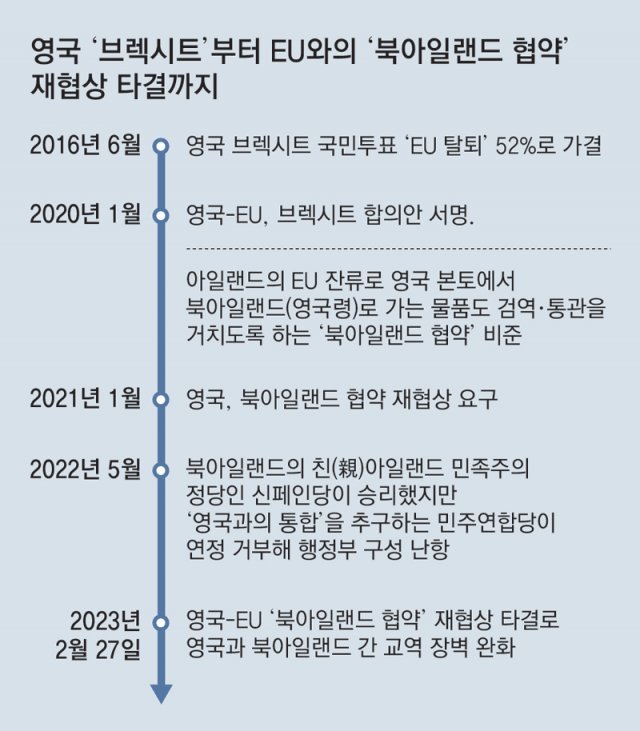Brexit follow-up agreement with EU
The United Kingdom and the European Union (EU) have agreed to a follow-up agreement to Brexit (the UK leaving the EU) that will lower trade barriers between the British mainland and Northern Ireland. Although Northern Ireland is a British territory, it remains in the EU single market even after Brexit because it is the same living area as Ireland, an EU member state. Due to its dual status, goods passing from the British mainland to Northern Ireland had to go through quarantine and customs clearance even though it was one country, but this barrier was virtually eliminated. In the three years since Brexit, both the UK and the EU have taken a step back from the Northern Ireland issue, which has caused conflict between major European countries and even forced the US to step forward.

British Prime Minister Rishi Sunak and European Commission President Ursula von der Leyen held talks in Windsor Castle, England, on the 27th of last month and agreed on the ‘Windsor Framework’, an amendment to the Northern Ireland Convention.
According to this, when British goods are transferred to Northern Ireland, it is decided to exempt the quarantine and customs clearance procedures for goods consumed in Northern Ireland by distinguishing between ‘remaining in Northern Ireland’ and ‘transferring to the EU single market such as Ireland’. The EU has allowed the Northern Ireland Parliament to veto new EU rules when they come into effect in Northern Ireland. In this case, the British government can exercise its influence. However, in the event of a trade dispute, the European Court of Justice (ECJ) will be the final arbitrator.
Even with Brexit coming into force in 2020, Northern Ireland remains in the EU single market. At the time, Irish citizens in Northern Ireland strongly protested, saying, “If you leave the EU, the economy will collapse.”
However, there were constant concerns that Northern Ireland could be abused as a ‘back door’ for goods to and from the UK and EU without tariffs. This is because people and goods can move freely between Ireland and Northern Ireland under the Belfast Agreement, which ended the bloody conflict in 1998. As a result, the UK made it necessary to go through cumbersome quarantine and customs clearance procedures for goods going from the mainland to Northern Ireland. Such trade barriers have been a factor in conflict between Northern Ireland as well as the UK and the EU.
The Wall Street Journal (WSJ) interpreted this agreement between the UK and the EU as “a need to end years of friction and expand cooperation in a situation where geopolitical risks are mounting in Europe due to the war in Ukraine.” U.S. President Joe Biden, who is of Irish descent, also praised it as “an important step forward to maintain and strengthen the hard-won peace with the Belfast Agreement.”
With the conclusion of this follow-up agreement, political and diplomatic confusion in the UK is expected to calm down somewhat. Sinn Fein, a nationalist party in Northern Ireland, won its first general election in May last year to become the No. 1 party. However, the Democratic Unionist Party (DUP), which has been advocating integration with the UK, is refusing to participate in the Northern Ireland government, saying that the trade barriers have damaged unity with the UK. In order to alleviate the conflict between the British and the Irish, the Northern Ireland government must form a joint government through a coalition between the federalist party and the nationalist party.
Prime Minister Sunak has found a ‘cunning idea’ to improve relations with the US and the EU without provoking the ruling Conservative Party, which led Brexit. Accordingly, it is evaluated that he threw the number of wins after four months in his inauguration.
But as the UK economy continues to stagnate three years after Brexit, many challenges remain. In the UK, public dissatisfaction is higher than ever due to a surge in electricity and gas rates, and confusion in the distribution of various food materials and daily necessities such as ‘logistics crisis’ and ‘vegetable crisis’. According to YouGov, a UK polling agency last November, 56% of respondents said Brexit was ‘wrong’, far ahead of ‘right’ (32%). In the UK, the word ‘Bregret’ (a compound word of Brexit and regret), which means regret about leaving the EU, has even been coined.
Cairo =
Source: Donga
Mark Jones is a world traveler and journalist for News Rebeat. With a curious mind and a love of adventure, Mark brings a unique perspective to the latest global events and provides in-depth and thought-provoking coverage of the world at large.